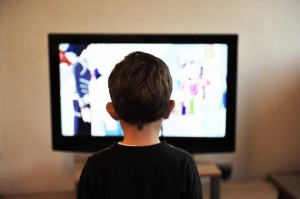 New findings about screen-time for babies and kids are something I keep a close eye on. As parent of three young children, I want to do what’s best for them. And yet I’m often tempted to use the television – “just one show” – when I need to get something done.
New findings about screen-time for babies and kids are something I keep a close eye on. As parent of three young children, I want to do what’s best for them. And yet I’m often tempted to use the television – “just one show” – when I need to get something done.
So I’ve been paying attention as the American Academy of Pediatrics updates its recommendations on kids and screen time. The organization made a preliminary announcement last fall, and is planning to release a full update later this year. The idea is to translate the data on how screens impact children’s health and wellness into recommendations that parents and policymakers can use.
Before these updates, the Academy’s most recent guidelines were published in 2013, and included a variety of recommendations, such as using rating systems to avoid inappropriate content, limiting screen time to 2 hours a day among youth, and establishing screen-free zones, such as bedrooms and the dinner table. The guidelines also recommended avoiding electronic media for children ages 2 and under.
The updated guidelines released last fall were based on a 2-day symposium of researchers focused on social science, educations, medicine, neuroscience and the media.
They offer parents more nuanced advice:
- Children need and expect limits in the virtual environment just as they do in any other environment. They need their parents to be involved in their screen time.
- Brain research shows that young children learn best through interacting with adults. So video-chatting with long-distance grandparents is better for kids than watching cartoons. But none of it takes the place of screen-free play on a daily basis.
- Children learn how to use technology based on their observations of adults around them. As a parent, it’s important to set limits on your own screen time and model on-line etiquette.
- What your children watch matters. After age two, research shows that technology can bridge achievement gaps at school, but only if it’s educational. Making sure your child is interacting with quality content is just as, if not more important than, setting strict time limits.
- Spending time with your children as they use technology has been shown to boost learning and improve social interactions.
- In modern society, online social networking is an essential part of adolescent development. Using social media with guidance from parents helps teen learn appropriate behaviors and develop their social identities.
Rachel Dunifon, a Cornell University College of Human Ecology faculty member and expert in child and family policy, says that while research supports that idea that too much media use is likely not ideal for children, parents should know that the studies showing linkages between media use and child well-being are not causal, and that the specific time limits and age cut-offs are somewhat arbitrary.
While limiting media use is a great goal for parents, she says it is also important that parents not take these recommendations as another source of stress or guilt in their lives.
Despite the new guidelines, not a lot will change at our house. We’ll continue to let our seven-year-old have some computer or TV time every day, but only after homework is finished. My five-year-old will continue to learn about reading and math through online educational games. And my husband and I will continue to reserve our own TV-viewing until after the kids go to bed, with some special exceptions such as a big sporting event or family movie.
And yes, every once in a while, I’ll turn on a show and plunk all three kids down in the living room so that I can get something done. But we’ll try our best to make that a rare exception.



For those interested,
an advocacy group with resources and information about limiting screen time is Campaign for a Commercial free Childhood:
http://www.commercialfreechildhood.org/
CCFC’s mission is to support parents’ efforts to raise healthy families by limiting commercial access to children and ending the exploitive practice of child-targeted marketing. In working for the rights of children to grow up—and the freedom for parents to raise them—without being undermined by corporate interests, CCFC promotes a more democratic and sustainable world (CCFC Mission Statement).
-Diane Wach , MA, MSEd